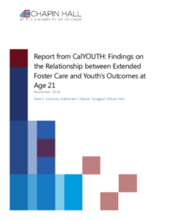Displaying 181 - 190 of 437
This Annie E. Casey Foundation brief, which utilizes the most comprehensive data set ever collected across all 50 states of the US, fills in key details about the lives of young people who have experienced foster care.
The chapter describes the rationale, research support, and techniques that support the application of parent–child interaction therapy (PCIT) to American Indian families.
This chapter provides updated information about the use of parent–child interaction therapy (PCIT) with young children who have experienced maltreatment.
Utilizing case examples, this discussion paper examines foster care decisions that disrupt important child-caregiver relationships.
This manuscript relies on two studies to learn more about the experience of adolescent-aged foster youth who utilize long-term mental health services coordinated through A Home Within, a national nonprofit committed to reducing treatment barriers by asking licensed therapists to provide pro bono therapy “for as long as it takes.”
This article examines family‐based interventions designed to increase parenting effectiveness, fathers' positive involvement, and couple relationship quality, all with the goal of enhancing children's development.
This paper reviews evidence from some well evaluated US reunification programs to investigate positive impact on post reunification outcomes such as preventing future maltreatment or future re-entry into care.
The aim of this study was to improve the mean time to initial foster care evaluation (TIE) from 32 to <7 days within 12 months for children in FC in Durham County, North Carolina.
The present report builds on prior research by examining outcomes from the third interview wave of the California Youth Transitions to Adulthood Study (CalYOUTH), which took place when study participants were 21 years old or older.
To illustrate design and implementation of the Strategies for Enhancing Early Developmental Success (SEEDS) Preschool Program, aimed at promoting school readiness in families connected to the child welfare system, the current paper uses parent- and teacher-reported data to summarize the progress of three participating families with diverse histories and presenting issues.


